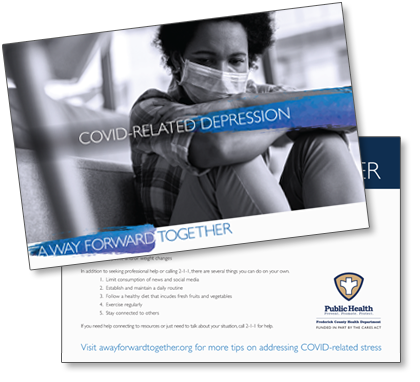
Depression
If you’ve been experiencing some of the following symptoms continuously for at least two weeks, you may be suffering from depression.
- Persistent sad, anxious, or “empty” mood
- Irritability
- Feelings of guilt, worthlessness, or helplessness
- Loss of interest or pleasure in hobbies and activities
- Decreased energy or fatigue
- Difficulty concentrating, remembering, or making decisions
- Difficulty sleeping or frequently oversleeping
- Appetite and/or weight changes
- Aches, pains, or digestive problems without a clear physical cause and/or that do not ease with treatment
In addition to seeking professional help or calling 2-1-1, there are several simple things you can do to help cope with depression.
1) Limit consumption of news and social media
While you want to stay informed on current events, it’s easy to be overwhelmed by the headlines and news feeds surrounding COVID-19 that will only feed negativity and fear. Reduce the number of times each day you check the news.
2) Establish and maintain a routine
Sleeping too much, skipping meals, and neglecting your personal care can deepen depression. Sticking to a daily routine adds structure to your day and focuses your mind on what you can control. Try to set times for exercising, spending time outside, and communicating with friends each day.
3) Follow a healthy diet
When stressed, we often turn to “comfort foods” that are usually packed with sugar and fat, and can adversely impact your mood. Focus on fresh foods that include plenty of fruits and vegetables. You can also increase your intake of foods with mood-enhancing nutrients, such as omega-3 fatty acids. These include fish such as salmon, tuna, and sardines, and vegetarian options like walnuts, kidney beans, brussels sprouts, spinach, and kale.
4) Exercise
Staying active is one of the most effective ways to boost your mood. In fact, regular exercise can often be as effective as a low dose of antidepressant medication in relieving depression. Even if you’re still under lockdown or a stay-at-home order, you can find some form of simple exercise to work into your daily routine indoors or around your neighborhood.
5) Stay connected to others
An important component of depression relief is simply being heard by someone. The person you talk to doesn’t have to come up with solutions or ways to “fix” you—a family member or friend who will listen to you without judgment or criticism is one of the best resources you can have to get through these challenging times.

